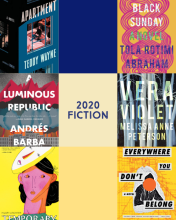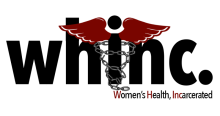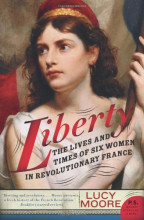Autumn Wetli-Staneluis
Library Blogs
Showing 21 - 27 of 27 items
Results
for Date: April 2020

Need to take a break from finishing up this wild semester and unwind? The library has access to a variety of e-books not limited to academic subject matter. Over the next few weeks, I'll be highlighting titles from the library's Online Recreational Reading guide, focusing on different genres and subjects each post. Today, I want to highlight some fiction books published in 2020 that we have available electronically.
•
In the time of COVID-19, I gained an opportunity of nature therapy as a caretaker for the Nichols Arboretum, and I recommend people also document the arrival of flowers and animals or participate in outdoor citizens and community science projects to channel anxiety.

Although the United States only has about 5% of the world’s population, it holds about 25% of the world’s prison population. According to the Prison Policy Initiative, the U.S. currently has about 2.3 million people in a variety of confinement facilities like federal and state prisons, local jails, juvenile correctional facilities, immigration detention centers, military prisons, civil commitment centers, and even state psychiatric hospitals to name some. While women currently make up approximately 10% of the currently incarcerated population, it is important to understand that the rate at which women are being incarcerated has been twice as much as men since the 1980s. Statistics collected by the Sentencing Project show that since the 1980s the number of women who are incarcerated has increased by more than 750%.
We found that many of the current resources speaking about mass incarceration in America are centered on the experiences of men but not as much is said about the experiences of women and gender nonconforming individuals. We believe that when discussing criminal justice reform, it is absolutely necessary to include women and gender nonconforming individuals in the discussion because their experiences precarcerally, carcerally, and postcarcerally, are uniquely shaped by their gender. Referring back to the Sentencing Project, 80% of women in jails are also mothers, most of whom were the primary caretakers for their children before being incarcerated. When women are incarcerated, there are these unique issues such as reproductive health that affect them and their families in ways that men do not necessarily experience. With this in mind, we wanted to create a platform to inform the general public about the experiences of women in the criminal justice system and create a space for those directly and indirectly affected by the carceral state to talk about their lived experiences and areas of expertise. We wanted to place a general focus on health because we believe that our current criminal justice system is a growing public health concern and is often left out of the conversation when we, as a society, talk about access to healthcare, among other things. Millions of individuals are getting locked up everyday for substance abuse offenses when they should be getting better access to treatments and resources to help with addiction as well as other monetary and mental health related concerns. Thousands of incarcerated pregnant women face horrific conditions because they lack any kind of proper access to reproductive healthcare. All of this--and more--needs to be brought to the attention of the public.
We found that many of the current resources speaking about mass incarceration in America are centered on the experiences of men but not as much is said about the experiences of women and gender nonconforming individuals. We believe that when discussing criminal justice reform, it is absolutely necessary to include women and gender nonconforming individuals in the discussion because their experiences precarcerally, carcerally, and postcarcerally, are uniquely shaped by their gender. Referring back to the Sentencing Project, 80% of women in jails are also mothers, most of whom were the primary caretakers for their children before being incarcerated. When women are incarcerated, there are these unique issues such as reproductive health that affect them and their families in ways that men do not necessarily experience. With this in mind, we wanted to create a platform to inform the general public about the experiences of women in the criminal justice system and create a space for those directly and indirectly affected by the carceral state to talk about their lived experiences and areas of expertise. We wanted to place a general focus on health because we believe that our current criminal justice system is a growing public health concern and is often left out of the conversation when we, as a society, talk about access to healthcare, among other things. Millions of individuals are getting locked up everyday for substance abuse offenses when they should be getting better access to treatments and resources to help with addiction as well as other monetary and mental health related concerns. Thousands of incarcerated pregnant women face horrific conditions because they lack any kind of proper access to reproductive healthcare. All of this--and more--needs to be brought to the attention of the public.

Liberty by Lucy Moore tells the story of six remarkable women who lived during the French Revolution. They came from a variety of social backgrounds, from aristocratic to working-class women. During these difficult times, it is fascinating to read about these women who lived during another difficult time.

The magazine O Menelick 2Ato is an independent editorial initiative - with a journalistic bias – that aims to reflect on and enhance the cultural and artistic production of the black diaspora in the Americas, with special emphasis on Brazil.
O Menelick 2Ato , created in 2010 in the city of São Paulo, has more than 20 printed editions published, and it’s always distributed for free throughout Brazil. More than 40 thousand copies of the magazine have been distributed over the 10 years of the project's existence. In spite of bringing together collaborators from the most diverse areas of artistic and cultural production - both Brazilians and foreigners - who understand the magazine as a space to share their perspectives and foster their ideas, creativity and concerns regarding the 21st century Brazilian black community, the magazine is closely linked to the history of the black press in Brazil. This connection begins with its title: O Menelick 2Ato honors one of the most important periodicals in the Paulista press, the newspaper O Menelick (1915).
I got to know Nabor Jr and Luciane Ramos Silva, the two editors of the magazine, during a research trip in São Paulo in 2018. Besides their work as editors of the magazine, Luciane Ramos Silva is an anthropologist, choreographer and dancer and Nabor Jr works as a journalist and independent photographer, while also being a staff member of the Museum Afro Brazil, one of the most important museums on African diaspora in the Americas. We have been working together on different projects since 2018, and in March 2019 Luciane Ramos Silva visited U-M to offer a series of workshops and talks on black press in Brazil. Aiming to build on this collaborative partnership, we started working on a special edition of their last issue in English. Until now, the magazine has been published only in Portuguese so having a first edition in English would help to reach new audiences as well as to bring awareness of different experiences of the black diaspora in the Americas.
O Menelick 2Ato , created in 2010 in the city of São Paulo, has more than 20 printed editions published, and it’s always distributed for free throughout Brazil. More than 40 thousand copies of the magazine have been distributed over the 10 years of the project's existence. In spite of bringing together collaborators from the most diverse areas of artistic and cultural production - both Brazilians and foreigners - who understand the magazine as a space to share their perspectives and foster their ideas, creativity and concerns regarding the 21st century Brazilian black community, the magazine is closely linked to the history of the black press in Brazil. This connection begins with its title: O Menelick 2Ato honors one of the most important periodicals in the Paulista press, the newspaper O Menelick (1915).
I got to know Nabor Jr and Luciane Ramos Silva, the two editors of the magazine, during a research trip in São Paulo in 2018. Besides their work as editors of the magazine, Luciane Ramos Silva is an anthropologist, choreographer and dancer and Nabor Jr works as a journalist and independent photographer, while also being a staff member of the Museum Afro Brazil, one of the most important museums on African diaspora in the Americas. We have been working together on different projects since 2018, and in March 2019 Luciane Ramos Silva visited U-M to offer a series of workshops and talks on black press in Brazil. Aiming to build on this collaborative partnership, we started working on a special edition of their last issue in English. Until now, the magazine has been published only in Portuguese so having a first edition in English would help to reach new audiences as well as to bring awareness of different experiences of the black diaspora in the Americas.

Even in these strange times, many of you will be graduating this Spring and beginning the search for your first job post-college. I wanted to gather a list of e-resources provided through the library that can help with the job search process. These online resources can help as you begin your search, write your cover letters and resumes, and prepare for interviews.
•
The author took a dive into the 10 key habits of various creatives to lead people to success.